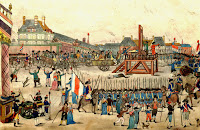skip to main |
skip to sidebar
 "Into your hands, O merciful Savior, we commend your servant N. Acknowledge, we humbly beseech you, a sheep of your own fold, a lamb of your own flock, a sinner of your own redeeming. Receive him into the arms of your mercy, into the blessed rest of everlasting peace, and into the glorious company of the saints in light. Amen."
"Into your hands, O merciful Savior, we commend your servant N. Acknowledge, we humbly beseech you, a sheep of your own fold, a lamb of your own flock, a sinner of your own redeeming. Receive him into the arms of your mercy, into the blessed rest of everlasting peace, and into the glorious company of the saints in light. Amen."
1979 BCP, p. 465, 483, and 499.
1928 BCP ("A Commendatory Prayer when the Soul is Departed"):
Into thy hands, O merciful Saviour, we commend the soul of thy servant, now departed from the body. Acknowledge, we humbly beseech thee, a sheep of thine own fold, a lamb of thine own flock, a sinner of thine own redeeming. Receive him into the arms of thy mercy, into the blessed rest of everlasting peace, and into the glorious company of the saints in light. Amen.
1883: The book annexed to the report of the Joint Committee on the Book of Common Prayer as modified by the action of the General Convention of MDCCCLXXXIII (New York: E. & J. B. Younge Co., 1885), 307:
Into thy merciful hands, O heavenly Father, we commend the
soul of thy servant, now departing from the body. Acknowledge, we meekly beseech thee, a sheep
of thine own fold, a lamb of thine own flock, a sinner of thine own
redeeming. Receive him into the arms
of thy mercy, into the blessed rest of everlasting peace, into the glorious
estate of thy chosen saints in heaven. O
most merciful Jesus, that thing cannot perish which is committed to thy charge;
Receive, we beseech thee, his spirit in peace. Amen.
1627: John Cosin, A collection of priuate deuotions, as reproduced in 1867:
Into Thy merciful hands, O Lord, we commend the soul of this
Thy servant, now departing from the body:
acknowledge, we meekly beseech
Thee, a work of Thine own hands, a sheep of Thine own fold, a lamb of Thine own
flock, a sinner of Thine own redeeming.
Receive him into the blessed arms of Thy unspeakable mercy, into
the sacred rest of everlasting peace, and into the glorious estate of Thy
chosen saints in heaven.
Steven A. Long, "Magisterial irresponsibility," First things no. 286 (October 2018): 43 (41-45). Great article.
"The [ancient] pagan regards the world as sacred because it is penetrated by divine presence; he therefore respects it to the point of worshipping it and does no damage to it. But he never worries about its fate because he believes in its eternity. He is also unaware of any need for transformation of nature or transcendence of its limitations; the world is good as it stands and possesses in its nature all that is necessary for its survival.
". . . The Christian regards the world as sacred because it stands in dialectical relationship with God; thus he respects it (without worshipping it, since it has no divine presence in its nature), but he regards the human being as the only possible link between God and creation, a link that can either bring nature in communion with God and thus sanctify it; or condemn it to the state of a 'thing', the meaning and purpose of which are exhausted with the satisfaction of man.
"Paganism sees man as part of the world; the Christian way sees him as the crucial link between the world and God, as the only person in creation that can lead it to survival. It is the second one that attaches to man responsibility for the fate of creation. Unless we decide to return to paganism, this second way would appear to be the only way to respect again the sacrality of nature and grapple with the ecological crisis."
John Zizioulas, "Priest of creation," chap. 24 in Environmental stewardship: critical perspectives — past and present, ed. R. J. Berry (London: T & T Clark, 2006): 289-290 (273-290). The whole essay builds to this summation. From p. 281:
A Christian who wishes to have both his or her doctrine of creatio ex nihilo and a faith that the world possesses in its nature some kind of means for eternal survival is bound to be logically inconsistent.
On the other "person[s] in creation", i.e. the angels, see p. 277, but especially 286, where only "man, unlike the angels . . . , forms an organic part of the material world, being the highest point in its evolution."
"the French scholarly term for the moment when the Declaration of the Rights of Man collapsed into the Terror."
Mark Bauerlein, citing Richard Bernstein's Dictatorship of virtue: multiculturalism and the battle for America's future (New York: Knopf, 1994), in "Hate signs," First things no. 286 (October 2018): 71 (72-71). Skid(ding), sideslip(ping), slippage, rasp(ing of metal on metal, presumably in conjunction with such a slide), deterioration. Inflationary spiral: le dérapage des prix.
 "Into your hands, O merciful Savior, we commend your servant N. Acknowledge, we humbly beseech you, a sheep of your own fold, a lamb of your own flock, a sinner of your own redeeming. Receive him into the arms of your mercy, into the blessed rest of everlasting peace, and into the glorious company of the saints in light. Amen."
"Into your hands, O merciful Savior, we commend your servant N. Acknowledge, we humbly beseech you, a sheep of your own fold, a lamb of your own flock, a sinner of your own redeeming. Receive him into the arms of your mercy, into the blessed rest of everlasting peace, and into the glorious company of the saints in light. Amen."
